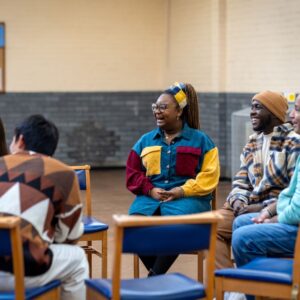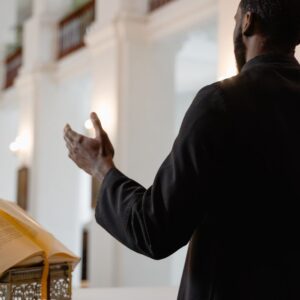It used to be said that in polite company, one should avoid talking about religion, politics and money.
That seems like such quaint advice, as if we could somehow compartmentalize the very things that shape how we see the world and live our lives.
Somehow, we have shifted from that cordial environment to where we are so tightly aligned with our political stances that they’re poisoning our relationships.
In today’s polarized times, political alignment is often a prerequisite for relationship, and nowhere is this more devastating than in faith communities. The intersection of theology and politics has become a minefield where even the most well-intentioned conversations can explode into fractured relationships and empty pews.
There was a time when people might have held strong opinions without letting those opinions determine whether they could respect someone on the other side. You could disagree with your neighbor’s politics and still borrow their lawnmower. You could worship alongside someone who voted differently and genuinely care about their sick child.
So, how do pastors ground their political engagements in theological principles while fostering community discussions about faith and civic responsibility?
The Varied History of Faith and Politics
Let’s begin by looking at the various ways faith traditions have historically engaged politics.
The Black Church: Born from Struggle
The Black Church has never had the luxury of separating faith from politics. From its origins in the 15th and 16th centuries, when enslaved Africans were forcefully baptized into Christianity, the church became a space of both survival and resistance. As historian Henry Louis Gates notes, the Black Church provided a liminal space brimming with subversive features during slavery, and later became the backbone of the Civil Rights movement.
Frederick Douglass delivered his first public speeches—sermons—at the AME Zion Church before he became known as an abolitionist leader. Martin Luther King Jr.’s theology of nonviolent resistance was deeply rooted in Black church tradition. And congressman John Lewis observed, “Slavery was our Egypt, segregation was our Egypt, discrimination was our Egypt”—the Exodus story became the theological framework for political action.
For Black Americans, survival required political engagement. The church wasn’t just a place of worship; it was the organizing center for resistance, the training ground for leaders, and the theological foundation for justice work. Politics wasn’t a distraction from the gospel—it was essential to living out the gospel in a society built on their oppression.
Mainline Protestants: The Social Gospel Tradition
Mainline Protestant churches developed their own tradition of political engagement through the Social Gospel movement of the late 19th and early 20th centuries. The Social Gospel emphasized applying Christian ethics to social problems, especially issues of social justice such as economic inequality, poverty, alcoholism, crime, racial tensions, slums, unclean environment, child labor, lack of unionization, poor schools, and the dangers of war.
Leaders like Washington Gladden and Walter Rauschenbusch argued that Christianity required not just personal salvation but “social salvation” that meant systemic changes in political structures. Charles Sheldon, a minister in Topeka, Kansas, explained the idea behind the social gospel in his 1897 novel “In His Steps”—to be a Christian, one needed to walk in Jesus’s footsteps, asking “What would Jesus do?”
This movement influenced Progressive Era politics and led to the establishment of the Federal Council of Churches in 1908. The Social Gospel’s impact on policies of most mainline denominations in the United States was lasting, even as the movement itself waned after World War I.
Quakers: The Peace Testimony
From their founding in 1650s England, Quakers embraced radical pacifism as a core theological conviction. “All bloody principles and practices we do utterly deny,” George Fox and other early Friends wrote to Charles II in 1660, “with all outward wars, and strife, and fightings with outward weapons, for any end, or under any pretence whatsoever”.
Yet their pacifism was anything but passive. From the refusal of many in the Society of Friends to take part in the horrific violence of the slave trade in the 1600s, to those who put their lives on the line by refusing to participate in wars or by speaking out for the humane treatment of all in our society, Quakers have a long legacy of confronting injustices and actively advocating for equality and the betterment of humanity.
Quakers were instrumental in the abolitionist movement, women’s suffrage, prison reform, and civil rights. The Religious Society of Friends was awarded the Nobel Peace Prize in 1947 in recognition of their contribution to meeting the needs of those affected by both world wars. Their theology demanded political engagement—but always through nonviolent means.
Evangelicals: The Great Reversal
Evangelicals followed a dramatically different path. For much of the 20th century, they practiced what historians call “the Great Reversal”—a deliberate withdrawal from political engagement to focus solely on personal salvation and evangelism. Jerry Falwell himself had preached the separationist view that church and politics do not mix for years before his dramatic change.
This changed in 1979 when Falwell declared he had been wrong to abstain from politics and founded the Moral Majority. As a trusted leader and man of God, Falwell affirmed political activism as a “Godly” mandate, and the Moral Majority quickly grew to several million members and was credited with helping elect Ronald Reagan in 1980.
Unlike other religious movements that centered their political engagement on social justice issues, Evangelical concerns centered on abortion rights, though the real roots were different: Falwell Sr. and other evangelical leaders felt the federal government was overreaching with its decision that racially discriminatory private schools, such as were being operated by evangelical groups, were not entitled to nonprofit tax-exempt status.
This Evangelical shift has had profound repercussions, with many tracing today’s Christian Nationalism to this point in history.
Perhaps We’ve Neglected Theological Thinking for Political Tribalism
The historical record shows us that faith communities have always engaged politics, and they’ve done so without the toxic fracturing we see today.
So what’s changed? It’s not that theological discourse has disappeared, since people across the political spectrum are still using theological language and making theological arguments they genuinely believe are biblical. The shift is more subtle. Perhaps theological thinking has become subordinated to political identity in ways that weren’t as prominent historically..
From Theological Reasoning to Theological Justification
Our predecessors engaged in a sort of theological reasoning, a process of wrestling with Scripture, tradition, and community wisdom to discern faithful responses to complex questions. They expected this process to be difficult, to take time, and sometimes to produce answers that didn’t align neatly with any political faction.
Today, it seems we’re more likely to engage in theological justification, starting with political positions and then finding biblical and theological resources to support them. The theological language sounds similar, but the process is fundamentally different. Instead of letting theology shape our politics, we use theology to validate political allegiances we’ve already formed.
This isn’t necessarily conscious or malicious. Most people genuinely believe they’re being faithful to Scripture. But the sequence matters: Do we start with “What does faithful discipleship require in this situation?” or do we start with “How can I defend the political position I already hold?”
The Loss of Theological Patience
Perhaps more significantly, we’ve lost the willingness to sit with complexity, to acknowledge mystery, and to distinguish between core theological convictions and their political applications.
Historical theological reasoning included space for faithful people to reach different conclusions about complex issues while maintaining unity around essential beliefs. The Social Gospel leaders could disagree about specific policies while sharing theological convictions about social justice. Evangelicals could have different views on particular political strategies while maintaining unity around gospel essentials.
Today’s theological discourse often demands immediate answers and absolute certainty. We’ve become uncomfortable with the tension between theological conviction and political complexity. Instead of saying “Here’s what Scripture teaches about justice, and faithful people might apply that differently in this specific situation,” we’re more likely to claim that our particular political application is the only theologically faithful option.
Perhaps no tradition offers more insight into maintaining community while navigating political differences than the Quakers. Their practice of corporate discernment includes waiting together for the Spirit’s leading rather than simply aggregating individual opinions, enabling them to address contentious political issues without fracturing.
The Shallow Formation Crisis
The shift toward theological justification has accelerated due to changes in how we receive theological formation. Instead of being shaped by deep engagement with Scripture, tradition, and community wisdom over time, many believers now get their theological education from sources designed more for political persuasion than spiritual formation.
Cable news, social media, and celebrity pastors who’ve become political pundits offer theological soundbites that support predetermined political positions rather than the patient work of theological reasoning that enables communities to navigate complex questions together.
The Echo Chamber Effect
Modern communication technology has also enabled us to surround ourselves with theological voices that confirm our political priors rather than challenge our thinking. Previous generations of believers were more likely to encounter theological perspectives that didn’t align perfectly with their political preferences, forcing them to wrestle with tension and complexity.
Now we can curate theological input that supports our political identity while avoiding voices that might complicate our certainties. This creates the illusion of theological depth while actually preventing the kind of theological reasoning that enabled our predecessors to engage politics faithfully.
The Loss of Theological Humility
Perhaps most troubling is the loss of theological humility, a recognition that our understanding of how theological convictions apply to specific political questions might be partial or mistaken. Previous generations of believers were more likely to hold their political applications of theological truth with appropriate tentativeness.
Today’s theological discourse often conflates theological conviction with political certainty in ways that make civil discourse nearly impossible. When we believe our political positions are directly mandated by God, disagreement becomes not just political difference but theological heresy.
The question isn’t whether we should engage politics theologically—we always have and always will. The question is whether we can recover the theological patience, humility, and reasoning practices that enabled our predecessors to engage politics as an expression of faithfulness rather than a test of orthodoxy.
Practical Steps for Recovering Theological Reasoning
Rather than simply calling for better conversations, our practical steps must address the above issues. Here are concrete practices communities can adopt to recover the theological depth that enables civil discourse:
1. Slow Down the Reasoning Process
The shift from reasoning to justification often happens because we feel pressure to have immediate theological answers to complex political questions. Communities need practices that intentionally slow down this process:
- Establish waiting periods: When political issues arise, commit to spending time in study and prayer before taking positions. The Quaker practice of “seasoning” – allowing time for reflection before making decisions – offers a helpful model.
- Practice theological questioning: Before asking “What does the Bible say about this policy?” start with deeper questions: “What does Scripture teach about human dignity? Justice? Community responsibility? The role of government?” Let these deeper theological foundations inform political applications.
- Separate conviction from application: Create space to distinguish between core theological beliefs (which should be held firmly) and their political applications (which faithful people might approach differently). Practice saying “Here’s what I believe theologically, and here’s how I think that applies politically, though others might apply it differently.”
2. Cultivate Theological Patience
Recovering the ability to sit with complexity and mystery requires intentional practice:
- Embrace “holy tension”: Teach communities that some political questions don’t have simple theological answers. Practice holding convictions about theological truth alongside uncertainty about political applications.
- Study historical examples: Examine how previous generations of believers navigated complex issues. How did abolitionists maintain unity while disagreeing about tactics? How did Social Gospel leaders hold together while pursuing different strategies?
- Practice intellectual humility: Regularly acknowledge that our understanding of how theological truth applies to specific political situations might be partial or mistaken. This isn’t relativism—it’s recognition that faithful discipleship requires ongoing discernment.
3. Deepen Theological Formation
Shallow formation leads to shallow political engagement. Communities must intentionally provide deeper alternatives:
- Create theological study groups: Move beyond topical Bible studies to deeper engagement with Scripture, church history, and theological tradition. Study how theological giants have approached the relationship between faith and politics.
- Diversify theological voices: Intentionally engage theological perspectives that don’t align perfectly with your community’s political preferences. Read theologians from different traditions, eras, and cultural contexts.
- Practice slow Scripture reading: Instead of proof-texting for political positions, engage in lectio divina, inductive Bible study, and other methods that allow Scripture to shape us rather than simply support our existing positions.
- Engage tradition and community wisdom: Learn from the theological reasoning of previous generations and other cultural contexts. How have Christians in different times and places approached similar questions?
4. Break Out of Echo Chambers
Theological echo chambers prevent the kind of reasoning that leads to wisdom:
- Seek theological challenge: Regularly engage with theological voices that complicate your political certainties. This doesn’t mean compromising core convictions, but allowing theological depth to challenge political simplicity.
- Practice charitable interpretation: When encountering theological arguments you disagree with politically, work to understand the theological reasoning behind them before critiquing the political conclusions.
- Cross-political theological dialogue: Create opportunities for people with different political views but shared theological commitments to reason together about how faith applies to public life.
5. Rebuild Theological Humility
Perhaps most importantly, communities need practices that cultivate appropriate tentativeness about political applications while maintaining conviction about theological truth:
- Distinguish between levels of certainty: Teach communities to hold core theological convictions (the Trinity, the gospel, human dignity) with great confidence while holding political applications with appropriate humility.
- Practice theological disagreement: Create safe spaces for people to disagree about political applications while affirming shared theological foundations. Learn to say “We both believe in justice, but we understand its political implications differently.”
- Regular examination of assumptions: Periodically examine whether your political positions are truly flowing from theological conviction or whether you’re using theology to justify political preferences formed through other influences.
6. Develop Collaborative Discernment
Move beyond individual opinion toward community wisdom:
- Corporate theological reasoning: Instead of having individual experts pronounce theological positions on political issues, engage in community processes of theological discernment that draw on the wisdom of the whole body.
- Multiple perspectives in leadership: Ensure that those guiding political conversations include people with deep theological formation, pastoral wisdom, and different life experiences that inform how theological truth might apply.
- Focus on formation, not just information: The goal isn’t to get people to agree on specific political positions, but to form people in theological reasoning processes that enable them to engage political questions faithfully.
The Goal: Theological Maturity in Political Engagement
These practices aim not to eliminate political engagement or differences, but to ground them in the kind of theological reasoning that enables civil discourse. When communities engage politics from a foundation of theological depth, patience, and humility, they model for the broader culture what faithful disagreement looks like.
The result isn’t uniformity of political opinion, but maturity of political engagement—the ability to disagree politically while maintaining fellowship, to hold convictions firmly while acknowledging complexity, and to bear witness to a different way of engaging the political questions that divide our culture.
Moving Forward Together
Creating theological frameworks for community conversations isn’t about finding the “right” political position—it’s about developing the spiritual maturity to engage political questions as disciples of Jesus. This requires intellectual honesty, emotional resilience, and a commitment to the long, slow work of community formation.
We won’t get it right immediately. There will be failed conversations, hurt feelings, and people who leave. But if we commit to the work of theological thinking together, we might discover something beautiful: communities where the good news of Jesus actually shapes how we navigate the complex political realities of our time.
At the Center for Transforming Engagement, we wholeheartedly believe that we can do better at having these conversations. See what we offer by clicking here.
Resources
Several organizations are pioneering work at the intersection of theology and political engagement:
- The Center for Faith and Justice (faithjustice.net) offers fellowship programs for exploring the spiritual dimensions of justice work
- Yale Center for Faith & Culture (faith.yale.edu) provides resources for engaging philosophical and religious traditions in public life
- The Faith & Politics Institute (faithandpolitics.org) cultivates dialogue among political leaders across party lines
- Faith in Public Life (faithinpubliclife.org) connects clergy and faith leaders committed to justice and the common good
- The BJC Center for Faith, Justice and Reconciliation (bjconline.org/center) offers educational programs on religious freedom with a justice lens
- The Center for Christianity & Public Life (ccpubliclife.org) focuses on Christian civic formation and public imagination
Sources
- “A Brief History of the Black Church’s Diversity, and its Vital Role in American Political History.” Interfaith America. May 30, 2024.
- “How the social gospel movement explains the roots of today’s religious left.” The Conversation. May 13, 2025.
- “Jerry Falwell.” Encyclopedia Virginia, December 22, 2021.
- “Jerry Falwell Helps Found the Moral Majority.” ARDA Timeline.
- “Moral Majority.” Britannica. February 12, 2018.
- “Progressive Christianity.” ProgressiveChristianity.org.
- “Progressive Theology.” Pathways Theological Education.
- “Quakers.” Wikipedia.
- “Quakers – Definition, History & Beliefs.” History.com. May 19, 2017.
- “Quaker Traditions of Pacifism, Activism, and Advocacy.” Sandy Spring Friends School.
- “Social Gospel. “Wikipedia.
- “Social Gospel.” Britannica. July 20, 1998.
- “The Black Church.” PBS American Experience. May 13, 2019.
- “The history and importance of the Black Church.” Harvard Gazette. January 10, 2024.
- “The Great Reversal.” The Oxford Academic. January 2022.











0 Comments